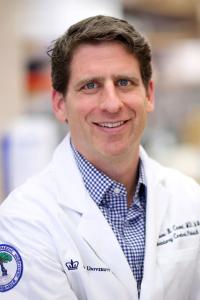Movement Recovery Lab Hosts Its Largest Group of Summer Research Students
This summer, the Weinberg Family Cerebral Palsy Center (WFCPC)'s Movement Recovery Lab is hosting nine student researchers—the most it has welcomed in a single year. The students come from a range of institutions, including the State University of New York, Washington University in St. Louis, Cornell University, Columbia College, and the Columbia University Vagelos College of Physicians and Surgeons. Each student is paired with a mentor from the WFCPC’s research or clinical team, contributing to projects in both preclinical and clinical areas of research in motor function and recovery.
Thomas Hunt, a rising second-year medical student at Columbia University Vagelos College of Physicians and Surgeons, is one of the students working in the lab this summer. He is assisting with the development and automation of SensiTrak, a tool that measures proprioceptive function in healthy and injured rodent models. His project focuses on refining SensiTrak into a lab-ready tool that can be used in preclinical behavioral studies.
“Preclinical research plays a critical role in advancing our clinical understanding,” said Hunt. “I'm grateful for the opportunity to contribute to this work and help bridge the gap between basic science and patient care.”
Isabel O’Malley‑Krohn, is also a rising a second-year medical student. She has been working in the lab since June, mentored by Postdoctoral Residency Fellow, Shaker Dukkipati, MD, PhD. Together, they are validating a combined brain and spinal cord stimulation method to assess the health of sensory and motor nerve tracts—and ultimately explore stimulation as a route toward motor recovery in individuals with cerebral palsy.
"I became interested in the lab’s work after attending a neurology lecture by Dr. Jason Carmel," said O’Malley-Krohn. “Having the summer to dive into a project is giving me perspective on the different facets of medical education outside the classroom. I’m learning skills—working as part of a team, reviewing scientific literature, and developing new techniques—all of which will serve me no matter what medical specialty I pursue.”
Also among this year’s cohort is Heera Santhosh, a second-year undergraduate student at Columbia College majoring in Neuroscience & Behavior. She is working on developing a low-cost, markerless motion capture system to help track motor recovery in individuals with cervical spinal cord injury.
"The goal is to incorporate this motion capture system into our pilot clinical trial of spinal cord stimulation in patients with cervical spinal cord injury," shared Evan Joiner, MD, PhD, Santhosh's mentor in the lab this summer. Dr. Joiner is a Columbia Neurosurgery Enfolded Spine Fellow currently completing a NIH funded research fellowship in the Movement Recovery Lab. His research focuses on the use of neuromodulation for movement recovery after spinal cord injury.

Jason Carmel, MD, PhD, with some of the Movement Recovery Lab's summer '2025 students
Santosh was drawn to the lab’s philosophy of “bench to bedside and back", or using preclinical models to study paralysis and designing human experiments based on those findings. Her grandfather, who is paralyzed from the waist down following a stroke, has shaped her understanding of the urgent need for translational research that directly improves patient outcomes.
"I could not be more grateful for the privilege of working alongside Dr. Carmel and Dr. Joiner in the Movement Recovery Lab," said Santosh. "They are deeply committed to mentoring the next generation of physician-scientists."
The Movement Recovery Lab is proud to support these students and their contributions to ongoing research. "We are always genuinely pleased to welcome students to the lab during the summer. Their arrival brings a fresh sense of energy and curiosity that enriches our research environment. It’s a meaningful reminder of our broader mission - to advance scientific inquiry while fostering a culture that encourages exploration and supports the growth of young researchers. The perspectives and enthusiasm students bring are deeply valued and play an important role in the continued vitality of our lab," said Aditya Ramamurthy, Lab Manager of the Movement Recover Lab.


